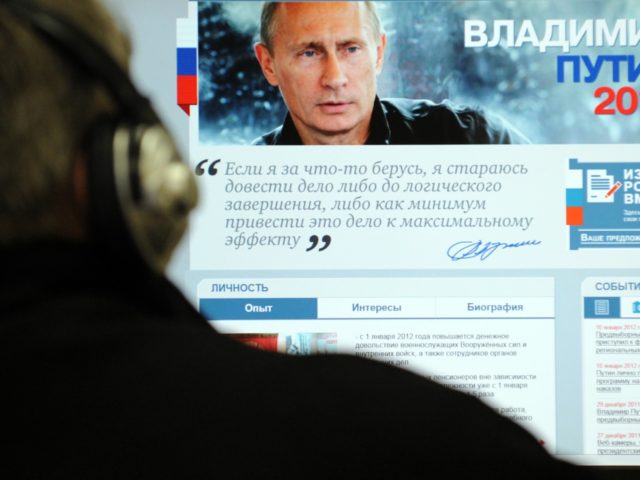Russian President Vladimir Putin signed a new law on Wednesday that paves the way for Russia to isolate its Internet from the rest of the world.
The so-called “sovereign Internet” law is billed as a means of making the Russian Internet more “independent,” but independence will be in short supply as Putin’s authoritarian government tightens its grip on cyberspace.
Radio Free Europe quoted Putin and his allies defending the law as a means of preventing the United States from cutting off Russia’s access to the global Internet by creating Russian servers that could manage and filter all traffic and requiring foreign Internet providers to use them.
Critics naturally suspect that a great deal of managing and filtering will be conducted by those Russian servers no matter what the U.S. does.
Russia’s Internet regulation agency Roskomnadzor is already eager to use its new powers to go after Telegram, a secure messaging application popular among Russians and others around the world who wish to communicate without the threat of government surveillance. Telegram was developed in Russia but has been effectively banned there since 2018, a prohibition many Russians evidently ignore.
“Activists fear an independent Russian internet would involve the creation of a Chinese-style national firewall to monitor and censor content passing in and out of the country,” CNN observed.
ZDNet reported the law has very little support from the Russian people – about 23 percent in the latest poll – but Putin’s government hotly desired it, as it is tired of chasing Internet providers and website administrators around to make them comply with censorship demands. Once the new system is fully up and running at the beginning of 2021, Roskomnadzor will be able to block content instantly and inescapably with the domain servers under its control instead of publishing blacklists and prodding ISPs to obey them.
Skeptics of Moscow’s claims that it merely wants to secure the Russian Internet against foreign blockades note that no country has ever been completely shut off from the global network, and the estimated $320 million price tag for setting up Russia’s “sovereign Internet” servers is a high price for an economically depressed country to pay for protection against an entirely hypothetical threat.
Forbes pointed out that Russia actually tested a total-disconnect scenario in 2014 and found everything went back online in less than 30 minutes, according to Russian media reports. This will add fuel to suspicions the true purpose of the sovereign Internet law is to reduce the already dismal Internet freedom of Russians even further.
“There is a lot of protests against the law. Activists, some politicians and internet users openly expressed their outrage. But main local telecoms supported the law because the Kremlin promised not to charge them for the black boxes,” the editor of an independent Russian news site told Defense One.
Another Defense One correspondent suggested Russia is gearing up for information warfare in the next decade and taking steps to shield itself from the sort of chaos it plans to unleash upon free societies:
“Ultimately, this boils down to the fact that the Russian government, its military, and its security services regard the population’s unrestricted Internet, social media, and mobile access as a significant vulnerability in what they see as future Western efforts to launch information and cyber ops against the state in order to disorient, confuse and otherwise divide the population and the government,” said Samuel Bendett, research analyst with the Center for Naval Analyses’ International Affairs Group. “Therefore, monitoring user content and recording user information is seen as pivotal in such a defensive effort.”
“The Russian government saw what such free information access can do in other countries, and defensive [information operations] is now part of the defense strategy,” Bendett said. “Therefore, access to user data is seen as key in preventing what Moscow sees as Western efforts to ferment some kind of ‘color revolution’ in the country.”
This explanation for Putin’s movies is particularly compelling when considering the economic damage Russia is likely to suffer from having a slower, more restricted Internet while the rest of the world achieves ever-greater speeds.

COMMENTS
Please let us know if you're having issues with commenting.